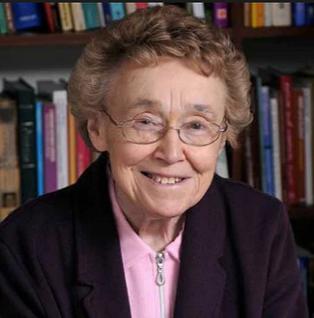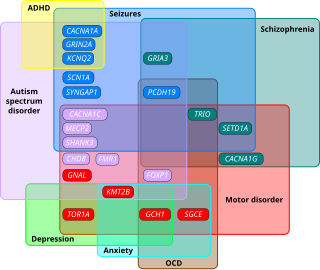Related Research Articles

Asperger syndrome (AS), also known as Asperger's syndrome or Asperger's, formerly described a neurodevelopmental disorder characterized by significant difficulties in social interaction and nonverbal communication, along with restricted and repetitive patterns of behavior, interests, and activities. The syndrome has been merged with other disorders into autism spectrum disorder (ASD) and is no longer considered a stand-alone diagnosis. It was considered milder than other diagnoses which were merged into ASD due to relatively unimpaired spoken language and intelligence.

Lorna Gladys Wing was an English psychiatrist. She was a pioneer in the field of childhood developmental disorders, who advanced understanding of autism worldwide, introduced the term Asperger syndrome in 1976 and was involved in founding the National Autistic Society (NAS) in the UK.
Childhood disintegrative disorder (CDD), also known as Heller's syndrome and disintegrative psychosis, is a rare condition characterized by late onset of developmental delays—or severe and sudden reversals—in language, social engagement, bowel and bladder, play and motor skills. Researchers have not been successful in finding a cause for the disorder. CDD has some similarities to autism and is sometimes considered a low-functioning form of it. In May 2013, CDD, along with other sub-types of PDD, was fused into a single diagnostic term called "autism spectrum disorder" under the new DSM-5 manual.

Autism spectrum disorders (ASD) are neurodevelopmental disorders that begin in early childhood, persist throughout adulthood, and affect three crucial areas of development: communication, social interaction and restricted patterns of behavior. There are many conditions comorbid to autism spectrum disorders such as attention-deficit hyperactivity disorder and epilepsy.

Neurodiversity is a framework for understanding human brain function that recognizes the diversity of human cognition as a biological fact. The neurodiversity paradigm argues that diversity in human cognition is normal and that some conditions classified as mental disorders are differences and disabilities that are not necessarily pathological.
High-functioning autism (HFA) was historically an autism classification where a person exhibits no intellectual disability, but may experience difficulty in communication, emotion recognition, expression, and social interaction.

The University of North Carolina TEACCH Autism Program creates and disseminates community-based services, training programs, and research for individuals of all ages and skill levels with autism spectrum disorder (ASD), to enhance the quality of life for them and their families across the lifespan.
Eric Schopler was a German born American psychologist whose pioneering research into autism led to the foundation of the TEACCH program.

Johann Friedrich Karl Asperger was an Austrian physician. Noted for his early studies on atypical neurology, specifically in children, he is the namesake of the autism spectrum disorder Asperger syndrome. He wrote more than 300 publications on psychological disorders that posthumously acquired international renown in the 1980s. His diagnosis of autism, which he termed "autistic psychopathy", also garnered controversy. Further controversy arose during the late 2010s over allegations that Asperger referred children to a Nazi German clinic responsible for murdering disabled patients, although his knowledge and involvement remains unknown.

Classic autism, also known as childhood autism, autistic disorder, (early) infantile autism, infantile psychosis, Kanner's autism, Kanner's syndrome, or (formerly) just autism, is a neurodevelopmental condition first described by Leo Kanner in 1943. It is characterized by atypical and impaired development in social interaction and communication as well as restricted, repetitive behaviors, activities, and interests. These symptoms first appear in early childhood and persist throughout life.

The Journal of Autism and Developmental Disorders is a monthly peer-reviewed medical journal covering research on all aspects of autism spectrum disorders and related developmental disabilities. The journal was established in 1971 as the Journal of Autism and Childhood Schizophrenia, obtaining its current title in 1979. It is published by Springer Science+Business Media and the editor-in-chief is Lynn Kern Koegel.
Ami Klin is an American psychologist who studies autism. He is the first chief of autism and related disorders at the Marcus Autism Center, a wholly owned subsidiary of Children’s Healthcare of Atlanta. Klin will also be a Georgia Research Alliance Eminent Scholar at Emory University and director of the Division of Autism and Related Developmental Disabilities in the Department of Pediatrics at the Emory University School of Medicine.
Autism, formally called autism spectrum disorder (ASD) or autism spectrum condition (ASC), is a neurodevelopmental disorder marked by deficits in reciprocal social communication, and the presence of restricted and repetitive patterns of behavior. Other common signs include difficulties with social interaction, verbal and nonverbal communication, perseverative interests, stereotypic body movements (stimming), rigid routines, and hyper- or hyporeactivity to sensory input. Autism is clinically regarded as a spectrum disorder, meaning that it can manifest very differently in each person. For example, some are nonspeaking, while others have proficient spoken language. Because of this, there is wide variation in the support needs of people across the autism spectrum.
Autism-friendly means being aware of social engagement and environmental factors affecting people on the autism spectrum, with modifications to communication methods and physical space to better suit individual's unique and special needs.
Gunilla Gerland is a Swedish author and lecturer on the topic of autism. Her written works include Secrets to Success for Professionals in the Autism Field: An Insider's Guide to Understanding the Autism Spectrum, the Environment and Your Role and her autobiography A Real Person: Life on the Outside.
Fred Robert Volkmar is a psychiatrist, psychologist, and the Irving B. Harris Professor of Child Psychiatry, Pediatrics, and Psychology at the Yale School of Medicine. From 2006 to 2014, he was the director of the Yale Child Study Center and the head of child psychiatry at Yale New Haven Hospital. Prior to these appointments, he was the director of the Autism Program at the Yale Child Study Center since 1983.
The history of autism spans over a century; autism has been subject to varying treatments, being pathologized or being viewed as a beneficial part of human neurodiversity. The understanding of autism has been shaped by cultural, scientific, and societal factors, and its perception and treatment change over time as scientific understanding of autism develops.

Thomas A. McKean is an American autistic author and lecturer. He is a poet, a singer-songwriter, an international speaker and a writer. He is the author of Soon Will Come the Light: A View From Inside the Autism Puzzle and Light On the Horizon: A Deeper View From Inside the Autism Puzzle. McKean has claimed that he did not speak until he was 16, but was able to describe how autism was like to him. He constantly fights various symptoms such as making strange noises, and says that perception of the senses causes low-intensity pain. McKean at one time earned a living traveling about and doing conferences and consulting work on autism. He has been described as having the unusual ability to be in the world of autism, yet also possesses the communication skills to describe what that world is like.
Caetextia is a term and concept first coined by psychologists Joe Griffin and Ivan Tyrrell to describe a chronic disorder that manifests as a context blindness in people on the autism spectrum. It was specifically used to designate the most dominant manifestation of autistic behaviour in higher-functioning individuals. Griffin and Tyrell also suggested that caetextia "is a more accurate and descriptive term for this inability to see how one variable influences another, particularly at the higher end of the spectrum, than the label of 'Asperger's syndrome'".

Edward Ross Ritvo was an American psychiatrist known for his research on genetic components of autism. He was a professor emeritus of UCLA's Neuropsychiatric Institute.
References
- 1 2 3 4 5 6 Gary B. Mesibov. Archived March 4, 2016, at the Wayback Machine Hunter College. Retrieved September 14, 2012.
- 1 2 Gary Mesibov to step down as director of UNC’s TEACCH program. Archived December 20, 2016, at the Wayback Machine University of North Carolina School of Medicine. Retrieved September 14, 2012.
- ↑ Gary B. Mesibov (1984). "Evolution of pediatric psychology: Historical roots to future trends." Journal of Pediatric Psychology, 9, 3–11.
- ↑ Mesibov, G. B. (1991). "What is special about pediatric psychology." Journal of Pediatric Psychology, 16, 267–271.
- ↑ White, S. (1991). A developmental history of the Society of Pediatric Psychology. Journal of Pediatric Psychology, 16, 267–271.
- ↑ Kazak, A. E. (2000). "Journal of pediatric psychology: A brief history (1969–1999)." Journal of Pediatric Psychology, 25(7), 463–470.
- ↑ Journal of Autism and Developmental Disorders. Springer, Part of Springer Science+Business Media. Retrieved September 14, 2012.
- ↑ John W. Hagen; Gary Mesibov. Verbal Labeling and Serial Position Recall . University of Michigan, Center for Human Growth and Development; 1968 [cited September 14, 2012].
- ↑ Gary B. Mesibov. Attributions of Responsibility: A Cognitive Interpretation . Brandeis University; 1974 [cited September 14, 2012].
- ↑ Eric Schopler; Gary B. Mesibov. Psychoeducational Profile – Revised (PEP-R) . Pro-Ed; January 1, 1979 [cited September 14, 2012]. ISBN 978-0-89079-238-4.
- ↑ Eric Schopler; Gary B. Mesibov. Autism in Adolescents and Adults . Springer; February 28, 1983 [cited September 14, 2012]. ISBN 978-0-306-41057-4.
- ↑ Eric Schopler; Gary B. Mesibov. (editors). Communication Problems in Autism . Springer; May 31, 1985 [cited September 14, 2012]. ISBN 978-0-306-41859-4.
- ↑ Eric Schopler; Gary B. Mesibov. Social Behavior in Autism . Springer; February 28, 1986 [cited September 14, 2012]. ISBN 978-0-306-42163-1.
- ↑ Eric Schopler; Gary B. Mesibov. Neurobiological Issues in Autism . Springer; April 30, 1987 [cited September 14, 2012]. ISBN 978-0-306-42451-9.
- ↑ Gary Mesibov; Eric Schopler. Adolescent and Adult Psychoeducational Profile (AAPEP) . Pro-Ed; September 1, 1988 [cited September 14, 2012]. ISBN 978-0-89079-152-3.
- ↑ Eric Schopler; Gary B. Mesibov. Diagnosis and Assessment in Autism . Springer; September 30, 1988 [cited September 14, 2012]. ISBN 978-0-306-42889-0.
- ↑ Eric Schopler; Gary B. Mesibov. Behavioral Issues in Autism . Springer; March 31, 1994 [cited September 14, 2012]. ISBN 978-0-306-44600-9.
- ↑ Eric Schopler; Gary B. Mesibov. Learning and cognition in autism . Plenum Press; 1995 [cited September 14, 2012]. ISBN 978-0-306-44871-3.
- ↑ Eric Schopler; Gary B. Mesibov. (editors). Parent Survival Manual: A Guide to Crisis Resolution in Autism and Related Developmental Disorders . Springer; June 30, 1995 [cited September 14, 2012]. ISBN 978-0-306-44977-2.
- ↑ Rhoda I. Landrus; Gary B. Mesibov. Structured Teaching . Division TEACCH; 1996* [cited September 14, 2012].
- ↑ Gary B. Mesibov; Lynn W. Adams; Laura G. Klinger. Autism: Understanding the Disorder . Springer; January 31, 1998 [cited September 14, 2012]. ISBN 978-0-306-45546-9.
- ↑ Eric Schopler; Gary B. Mesibov; Linda J. Kunce. Asperger Syndrome or High-Functioning Autism? . Springer; April 30, 1998 [cited September 14, 2012]. ISBN 978-0-306-45746-3.
- ↑ Gary B. Mesibov; Victoria Shea; Lynn W. Adams. Understanding Asperger Syndrome and High Functioning Autism . Springer; August 31, 2001 [cited September 14, 2012]. ISBN 978-0-306-46626-7.
- ↑ Gary Mesibov. Accessing the Curriculum for Pupils with Autistic Spectrum Disorders: Using the TEACCH Programme to Help Inclusion . Taylor & Francis; June 20, 2003 [cited September 14, 2012]. ISBN 978-1-85346-795-0.
- ↑ Gary B. Mesibov; Victoria Shea; Eric Schopler. The TEACCH Approach to Autism Spectrum Disorders . Springer; December 7, 2004 [cited September 14, 2012]. ISBN 978-0-306-48646-3.
- ↑ Gary Mesibov. AAPEP . PRO-ED; 2007 [cited September 14, 2012].
- ↑ Gary Mesibov; John B. Thomas; Michael Chapman. Teacch Transition Assessment Profile (TTAP) . Pro Ed; December 31, 2007 [cited September 14, 2012]. ISBN 978-1-4164-0193-3.
- ↑ Ruth Aspy; Barry G. Grossman; Gary B. Mesibov, Ph.D. (FRW). Designing Comprehensive Interventions for High-Functioning Individuals with Autism Spectrum Disorders: The Ziggurat Model . Autism Asperger Publishing Company; August 31, 2011 [cited September 14, 2012]. ISBN 978-1-934575-96-3.
- ↑ Gary Mesibov; John B. Thomas; Michael Chapman. Teacch Transition Assessment Profile, Computer Version (Ttap-cv): Computer Version . Pro Ed; March 30, 2012 [cited September 14, 2012]. ISBN 978-1-4164-0501-6.
- ↑ "Honorary Doctorate Degree awarded to Dr. Gary Mesibov". July 21, 2011.
- ↑ "July 2010—Dr. Gary Mesibov recognized with receipt of Autism Society of America's Founder's Award". July 13, 2010.